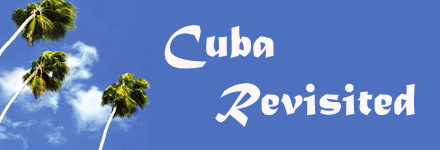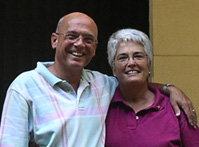After 44 years
of keeping our
early memories
of our childhood
in the island in
the back of our
minds, it was complete
overload for Mauricio
and me to face
it all again in
a 5 day visit.
Our emotions shut
down to a great
extent for the
duration of the
stay, and it is
now, as I process
the 450 digital
photos I took and
put my thoughts
in order to write
this, that I am
beginning to feel
the sadness of
witnessing how
time has in great
measure stood still
for the people of
Cuba, who struggle
to lead their lives
from day to day with
no constants but
uncertainty and the
lack of free choice.
We are
very glad we took
this journey at this
time in our lives.
The words that
follow express what
we experienced in
this moment in time
in Cuba ’s
unique and ever evolving
circumstances, a
land of paradoxes
in great part due
to the injustice
of a dual currency
economy. Anyone who
visited the island
previously or will
follow us in the
future will not necessarily
reach the same conclusions,
since events unfold
and change there
at the pleasure of
the current government. These
words are not
meant in any way
to be a political
statement or even
to pass judgment
on the current regime,
but simply a personal
summation of our
pilgrimage. Our
five days in Havana
opened the doors
to the youth we had
lost but not forgotten.
What did we find?
Since the most uttered
phrase in the current
Cuban vernacular
is no
es fácil,
meaning that things
are not easy,
first
the bad:
- Our families’ houses
are almost unrecognizable,
as most are in
disrepair and many
are being used
as government offices
and schools. Although
they saddened us,
they did not make
us cry…we
were curiously
and unexpectedly
detached, since
our street landmarks,
yards and furniture
are long gone.
All that remains
are inanimate walls
with no reference
points. Our old
homes now exist
only in our memory.
- Although our
parents’ generation
is still considered
to be gusanos,
our generation
has been reinvented
as Peter
Pans,
and declared acceptable
by the government
(at least until
further notice).
They have convinced
the population
of this fact through
the airing of a
documentary on
the Peter Pan program
of the sixties
(sending unaccompanied
children to the
US as exiles to
escape the clutches
of the Revolution)
on the government
controlled TV,
as satellite dishes
and independent
broadcast cable
services are forbidden
though often obtained
illegally. After
disputing this
label a few times,
we were informed
that it was “to
our advantage” to
be considered thus,
and we gave up
the argument.
- Government security
agents are in evidence
all over Havana
and serve a dual
purpose; they intimidate
the population
by their constant
presence and supposedly
protect the tourists
from the locals.
Although dressed
in suits, not military
uniforms, they
stand guard with
earpieces and radios
in hotel lobbies
and entrances,
in street corners
and in many places
where tourists
converge, making
sure that no Cuban
nationals enter
hotels or dollar
stores unless
accompanied by
a tourist as is
the case with the jineteras.
- The image of
Ché Guevara
is everywhere in
Havana, unlike
Fidel who is mostly
absent from the
current iconography
of the city. It
seems that the
population feels
the Revolution
lasted 15 years,
from 1959 to the
mid seventies,
and believes that
Ché was
the true Marxist-Leninist
visionary who died
for his beliefs,
while Fidel’s
charisma and uncanny
ability to reinvent
their society as
need be is what
has allowed him
to outlast the
terms of 10 US
presidents, and
to survive even
the end of the
cold war and the
subsequent difficult “Special
Period”.
- Cubans
who work for the
government, receive
a salary ranging
from $5 to $50,
paid in Cuban pesos
which
are now worth only
about 4 cents to
the US dollar.
Yes, they have
free health care
(but no medicines)
and a free education,
but after trying
to feed and house
a family using
their meager government
salary to buy the
food rations allotted
them every week,
they know
that the only way
to survive is to resolver by
selling whatever
they can get their
hands on in
the mercado
subterráneo,
or to work in the
tourist industry
in some fashion.
Thus, even though
they are trained
engineers, doctors
or teachers, they
choose to drive boteros,
service the tourists
as jineteras,
or work in hotels
and restaurants
that pay in chavitos.
- The collective
consciousness of
the Cubans who
have remained on
the island since
1959 is skewered
by the absence
of the free flow
of information.
Some are lucky
enough to have
computer access
through their work
and are able to
send and receive
email, but few
are able to cruise
the World Wide
Web. They are able
to watch some
of the new international
films months after
they are released
in the rest of
the world, but
magazines and newspapers
are strictly controlled.
Cubans are
hampered by the
lack of free choice
and the pervasiveness
of a controlled
mass media. This
was very hard to
witness for a retired
librarian like
myself.
Now for the good
things that made
our visit memorable
and emotionally rewarding.
First and foremost,
the people are
the same high spirited
Cubans we remember;
hardworking as long
as they are working
for themselves, resourceful,
warm, friendly, welcoming,
and most of all frank.
They made us realize
that while the walls
of our deteriorating
homes did not move
us as we anticipated,
they did. We were
invited into the
homes of many Cubans
we met casually while
walking the streets
trying to find old
landmarks. We saw
firsthand the hard
lives they lead,
their clean and neat
but humble homes,
their pride in what
little they have,
and the value they
still place on family
ties, human kindness
and friendship. They
made us aware of
the fact that we
are able to take
our freedoms and
rights for granted
because of the sacrifice
of the previous generation
that was willing
to uproot us to assure
our future. Never
were we made to feel
that anyone was looking
for a handout. When
we offered them some
of the things we
had brought to give
away as presents,
they would always
refuse until we insisted,
and then their faces
showed us how unbelievably
grateful they were
that we cared enough
about their welfare
to help
them.
Another great facet
of our visit was
the joy we felt in
reveling in the amazing
natural beauty of
the island, which
no amount of peeling
paint and broken
pavement can detract
from. It was truly
satisfying to have
the sight and sound
of the ocean waves
breaking on rocks
always within reach,
to admire the bright
blue skies with the
ever present stately
royal palms reaching
out to touch the
clouds, and the lush
vegetation growing
right out of the
ruins of the plentiful derrumbes.
Finally, Mauricio
had the added pleasure
of finding a
long lost cousin
in Havana and visiting
the old family homes
with him and his
family. It was wonderful
to see them reconnect
after so many years
and value their kinship,
even though they
differ in their politics
and life experiences.
So in closing, our
much awaited revisit
to the island of
our birth proved
to be a valuable
and enriching experience.
It was enlightening,
stimulating, thought-provoking
and made us glad
that by bringing
70 pounds of medicines
plus toys and some
personal products
to a handful of our
less fortunate fellow
Cubans, in a very,
very small way we
were able to make
a bit of a difference
in their lives at
this moment in time.
In the end, that
is all that matters.
December 2, 2004
|



